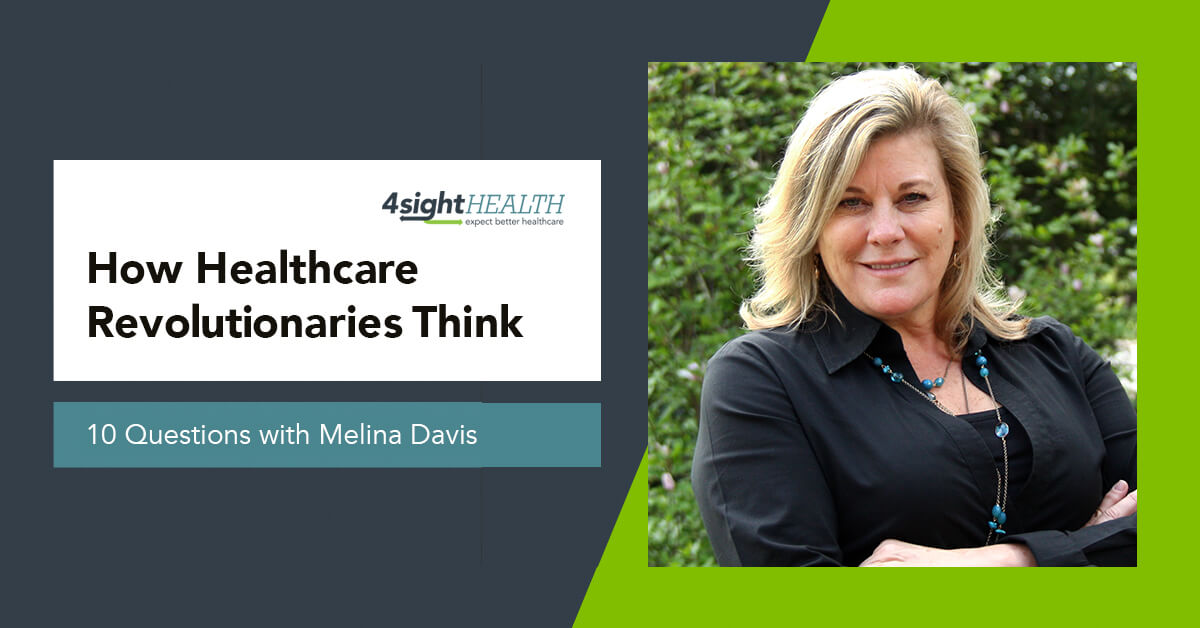January 19, 2023

How Healthcare Revolutionaries Think with Melina Davis
Welcome to the latest installment of 4sight Health’s series, How Healthcare Revolutionaries Think. Our interview series profiles healthcare instigators who believe that outcomes matter, customers count and value rules.
When’s the last time you asked your doctor about how they’re doing? How their family is doing? What they did over the weekend? Where they went on vacation? What they ate for lunch? When did they last eat or go to the bathroom? Chances are you don’t remember because you probably didn’t ask.
That’s a big part of the problem causing physician burnout. Patients don’t see doctors as people. Doctors don’t see themselves as people. Both see doctors as medical machines whose sole purpose is taking care of people who are sick or injured.
Melina Davis is out to change that. Davis is the CEO and executive vice president of the Medical Society of Virginia, and the way she’s changing that dynamic head on is through her brainchild SafeHaven.
SafeHaven is a not-for-profit program that offers confidential resources to doctors and other clinicians suffering from career fatigue, burnout and other mental health issues. I spoke with Davis, who is not a doctor, about what she thinks of physicians, strategy, and building a team to execute a strategy.
You can also listen to a podcast interview with Davis on how she came up with the idea for SafeHaven.
1. Melina, how do you define a healthcare revolutionary? What are your criteria? What are their personality traits? What are their unique characteristics?
Davis: It’s such an interesting question. Our current healthcare market requires much more creativity, strategy and agility than it did in the past. Today, healthcare revolutionaries are laser-focused on solving complex and important problems that affect the lives of most Americans and possibly patients around the world. They take on the role of innovator and collaborator and change-maker to address unhealthy cultures and system-level problems in the industry. These are the people taking on these challenges in their sphere of influence and where they’re convinced they can make a difference.
2. Given your definition, who is your favorite healthcare revolutionary, past or present?
Davis: To me, Melinda Gates is doing some really incredible things with human-centered design around global health, particularly for the most vulnerable women and girls. Her work is very interesting, very compassionate and very smart. I’d also put our current president (of the Medical Society of Virginia), Harry Gewanter, M.D., on the list. He’s a pediatric rheumatologist. He’s committed his life to advocate for a healthcare system that works better for patients. He crusades for patient care. He’s someone who channels all their passion and uses all their influence to make the world a better place.
3. If we put Melinda Gates and Dr. Gewanter in the same room, what would happen?
Davis: I would love that. One of the things I love about Harry is that he has one of the purest hearts of anyone I’ve ever met. She is looking for people like that — people who have ideas, who have passion — in her work. They certainly would go on an interesting journey together and be able to bring others to the table, which is where I think really complex problems get solved. That would be fun.
4. Melina, do you consider yourself a healthcare revolutionary like Gates or Dr. Gewanter?
Davis: It’s hard to talk about yourself in terms like that. I’m not sure many of us walk around thinking of ourselves in a particular labeling way. But I would say I’m certainly a change-maker, and I’m an advocate for a healthier healthcare system. I do believe that looking at innovative solutions is important and not limited to the for-profit arena. I also believe that collaboration is really key to making a difference. The bigger the issue, the more complex the issue, the more stakeholders it takes to make an impact. I would say in those ways, I do try to be transformative.
5. Let’s shift to the topic of physician burnout. Burnout has been around as long as there have been doctors. What’s different today? Is it the prevalence? Is it the severity? Is it the consequences? Is it the willingness to seek help?
 Davis: I would say yes. To all those. They’re all true. Healthcare has become so complex. We’ve put so much administrative work between the physician and the patient. Doctors went into medicine to help people and to create better outcomes for patients. There’s a lot that’s getting in the way of their ability to do that. The pandemic certainly exacerbated everything we were already seeing.
Davis: I would say yes. To all those. They’re all true. Healthcare has become so complex. We’ve put so much administrative work between the physician and the patient. Doctors went into medicine to help people and to create better outcomes for patients. There’s a lot that’s getting in the way of their ability to do that. The pandemic certainly exacerbated everything we were already seeing.
You have situational and systemic burnout in a profession and an industry that encourages its members and its leaders to just “buckle down.” Don’t worry about yourself. Go there for the mission. Go there for others. Ignore your needs to help others. It’s a recipe for burnout. We must address the situational but more importantly the systematic burnout. We must encourage people to get help and drop the stigma of seeking help from the profession. These are not easy elements to address, but they’re all important.
6. Other than the biannual Mayo Clinic survey on physician burnout and a few other surveys of doctors who say, “Hey, we’re burning out!” how is physician burnout manifesting itself in real life, in the field? What are some clues that the situation is worse now than it has been in the past?
Davis: You’re seeing many more retirements. You’re seeing many more people planning to retire earlier in their medical career than they planned. You see people leaving private practice and going to work for an employer as an employee, trying to get rid of some of the weight that they’ve experienced. We also hear reports of short tempers, difficulty in social interactions, people calling out sick. With nurses in particular, you’ve seen the traveling nurse situation really increase, adding a lot of expense to the system because nurses are trying to find that safe zone for them to protect themselves while also serving patients. There are so many visual or recognizable symptoms.
7. SafeHaven operates in two states: Michigan and Virginia. You want to expand to other states. Do you step on anyone’s toes when you go into a state? Maybe someone like a state medical society or medical licensing board? Someone who says it’s their job to help physicians manage burnout.
 Davis: When we work with other states, we really emphasize how important it is to work inside of their state to make sure that we know their laws, we know all their stakeholders and that we give everyone a chance to talk through it and address any and all of their concerns before any program is put in place.
Davis: When we work with other states, we really emphasize how important it is to work inside of their state to make sure that we know their laws, we know all their stakeholders and that we give everyone a chance to talk through it and address any and all of their concerns before any program is put in place.
That said, we will not go into a state without the permission of that state medical society. Ultimately, ours is not to tell a state what to do but to support physicians in that state through that state’s medical society. It’s a very collaborative effort intentionally because that’s how we’re going to destigmatize this. That is how we’re going to make people feel safe.
8. You’re not a doctor. What have you learned about doctors working for the medical society and SafeHaven that you didn’t know before? Something you thought they were but weren’t. Something they weren’t and turned out to be?
Davis: This should have occurred to me earlier because I have been around doctors a lot of my life. Doctors and nurses are among the best learners we have in society. They’re dedicated, active learners. They’re hungry to figure out problems. Their work ethics are incredible, generally speaking. I think I knew that but didn’t understand the level to which that was true.
I also didn’t realize how little time they had to take care of themselves, socialize with one another at the water cooler, see family, take a vacation, do chores around the house, run errands — basically take care of themselves. There is a culture of denying yourself to serve others. All of these things combined means we’re driving them to a place of, if you will, emotionally, great thirst and great hunger and that we really need to right the situation, so we get the best from them, not the worst from that combination.
9. Let’s talk about your best and worst. You describe yourself as a strategist. Tell me about a strategy or idea you had that didn’t work out and what you learned from the experience.
Davis: The biggest lessons of my life all have come from the failures, I will say. I had a startup idea that I worked with on a team where egos became the center of too many of the decisions. That affected the culture and our ability to retain talent and engage our partners at the level that the mission required. I now get to build a project that meets partners’ needs and goals simultaneously, where I focus on making sure everyone’s needs are met. Not every stakeholder person’s needs are the same. Not all of their goals are the same.
That was a big lesson from that startup experience. What does that partner need and how do I help them get their need met? The project then takes on much more of a service orientation but a service orientation that leads to the mission outcome. It’s not easy. We’re all ambitious. Where there’s ambition, there is ego. If you let it, ego can be detrimental to achieving great things in a team.
10. Now I’m curious about your hiring philosophy or team-building philosophy. Is there a certain test or a question you ask to make sure that person has the traits you’re looking for?
Davis: That’s a fun question. I will tell you our hiring process is a process. I’m the last person typically to meet with whoever we’re likely to hire. We make sure that whoever we’re bringing in, of course, gets to interview with the supervisor they’ll work with, human resources and any impactful leader who might be on their team. But we also make sure any staff member who might interact or work with this person in a collaborative or dependent way gets a chance to meet with them, too, in a small group. While that group may not make the final decision, their learnings from that interaction, their feedback from that interaction, are really important to us in the hiring process.
We don’t want everybody to be the same, but we do want to make sure that they can collaborate, they can work well with others and they can get along well in a challenging environment. The questions that come from those small groups always are different than what you’d put on an interview questionnaire.
Then I’m the last person. I get the recommendation before they come into my office. I’m the backstop to any potential culture problems. That could be that the person is too incredible or that they’re not a good fit. It could be one, the other or some combination. Usually by that time everyone has been through the process, it’s a pretty easy decision. But I have been known to say no. Really, I would say the key is again, that collaborative process and taking our time so we make the right choice for what we need to do.
Burda’s Final Bit
Hiring a team to execute a strategy is art, not science. As a manager, it took me years to get hiring right. I batted about .500 to start but raised my average to .750 or better by the end of my managerial career. How? I constructed a four-box matrix. The boxes along the X-axis were “competent” and “incompetent.” The boxes along the Y axis were “asshole” and “not an asshole.” I asked each of our staff members who interviewed a job candidate to check the box that they felt the candidate was in. I added up the results, and things worked out pretty well. What Davis is telling you is this. No matter how revolutionary your healthcare idea is, you need a team to execute it, and the fastest way to mess up the team is by hiring a person who puts ego above the goal of the strategy. Sounds simple. But clearly hard to do.
Read More Interviews with Healthcare Revolutionaries
- December 2022: Bruce Brandes
- November 2022: Lena Chaihorsky
- July 2022: David Nash, M.D.
- June 2022: Esther Dyson
- April 2022: Meghan Conroy
- March 2022: Adrianne Nickerson
- February 2022: David Snow
- January 2022: Kristen Valdes
- October 2021: Glen Tullman
- September 2021: David Greenberg and Dave Jacobs
- August 2021: Jeff Jones
- July 2021: Scott Powder
- June 2021: Robert Pearl, M.D.
- May 2021: Kurt Waltenbaugh
- April 2021: Jon Pearce
- March 2021: Thompson Aderinkomi
- February 2021: Gaurov Dayal, M.D.
Melina Davis is a Virginia-based community leader and innovation and strategy expert. She is a member of Hyperloop Transportation Technology, Inc.’s network of contributors and serves as the company’s Virginia Leader for HTT’s U.S. Public Affairs Team. She is also the CEO and Executive Vice President of the Medical Society of Virginia (MSV). MSV is the professional association for physicians in the Commonwealth. As the chief staff officer, Melina is responsible for managing all MSV related companies and subsidiaries.
Melina is known for her entrepreneurial approach and ability to motivate and stimulate creativity, and deliver impactful results and brings executive level skills in management, technology, cause marketing, engagement and strategic partnerships. She was also Co-founder of PlanG Holdings, Incorporated, a start up company and cause marketing engagement platform. Over the course of her career, she has worked for various nonprofit organizations, raising more than $140 million dollars. She has also served as a senior consultant with Fortune 500s as well as international and regional mid-size firms.





